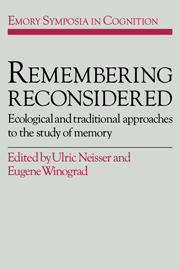Book contents
- Frontmatter
- Contents
- Preface
- List of contributors
- 1 New vistas in the study of memory
- 2 Continuities between ecological and laboratory approaches to memory
- 3 Memory for randomly sampled autobiographical events
- 4 Ordinary everyday memories: Some of the things of which selves are made
- 5 Walking in our own footsteps: Autobiographical memory and reconstruction
- 6 Memory observed and memory unobserved
- 7 The maintenance of marginal knowledge
- 8 The content and organization of autobiographical memories
- 9 The ontogeny of memory for real events
- 10 The functions of event memory: Some comments on Nelson and Barsalou
- 11 “The Wreck of the Old 97”: A real event remembered in song
- 12 Passive remembering
- 13 Remembering without experiencing: Memory for reported events
- 14 What is ordinary memory the memory of?
- 15 Go for the skill
- Name index
- Subject index
14 - What is ordinary memory the memory of?
Published online by Cambridge University Press: 25 March 2010
- Frontmatter
- Contents
- Preface
- List of contributors
- 1 New vistas in the study of memory
- 2 Continuities between ecological and laboratory approaches to memory
- 3 Memory for randomly sampled autobiographical events
- 4 Ordinary everyday memories: Some of the things of which selves are made
- 5 Walking in our own footsteps: Autobiographical memory and reconstruction
- 6 Memory observed and memory unobserved
- 7 The maintenance of marginal knowledge
- 8 The content and organization of autobiographical memories
- 9 The ontogeny of memory for real events
- 10 The functions of event memory: Some comments on Nelson and Barsalou
- 11 “The Wreck of the Old 97”: A real event remembered in song
- 12 Passive remembering
- 13 Remembering without experiencing: Memory for reported events
- 14 What is ordinary memory the memory of?
- 15 Go for the skill
- Name index
- Subject index
Summary
This chapter consists of three relatively independent sections. The first provides an overview of recent developments in various fields of memory, the second suggests an ecological way of thinking about memory for personally experienced results, and the third offers a conjecture about the relation between personal memory and spatial orientation. My own confidence in the several sections is mirrored by their order of presentation: I think of section I as almost incontrovertible, of section II as an essentially reasonable proposal, and of section III as frankly speculative.
The new memoria
In the past 10 or 15 years, the psychology of memory has undergone a fundamental change. This shift, which began well before the current interest in the possibilities of an ecological approach, has not been the work of any one individual or research group. What has happened is not merely the emergence of a new method or a new theory, but a change in our notions of what kinds of things people remember in the first place. In effect, we have a new definition of what memory is of.
Twenty years ago, the principal function of memory was assumed to be the storage of individual experiences and actions. The strings of numbers, words, or pictures that subjects were asked to remember in the laboratory were surrogates for the sequences of specific stimuli (or percepts or responses or ideas or whatever) that they presumably experienced and remembered in the outside world.
- Type
- Chapter
- Information
- Remembering ReconsideredEcological and Traditional Approaches to the Study of Memory, pp. 356 - 373Publisher: Cambridge University PressPrint publication year: 1988
- 37
- Cited by

